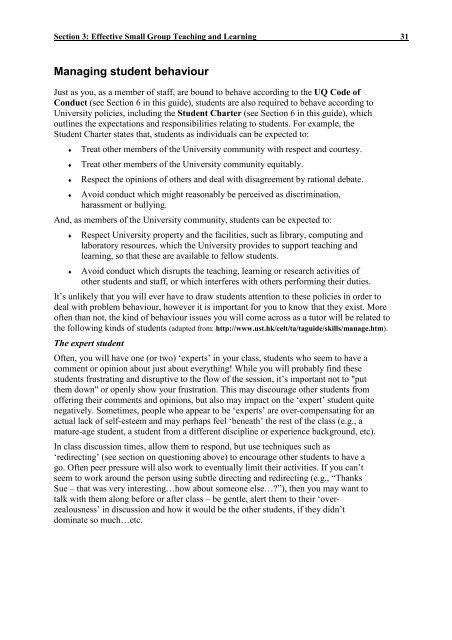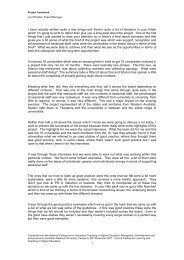A tutor's guide to teaching and learning at UQ - TEDI - University of ...
A tutor's guide to teaching and learning at UQ - TEDI - University of ...
A tutor's guide to teaching and learning at UQ - TEDI - University of ...
Create successful ePaper yourself
Turn your PDF publications into a flip-book with our unique Google optimized e-Paper software.
Section 3: Effective Small Group Teaching <strong>and</strong> Learning 31Managing student behaviourJust as you, as a member <strong>of</strong> staff, are bound <strong>to</strong> behave according <strong>to</strong> the <strong>UQ</strong> Code <strong>of</strong>Conduct (see Section 6 in this <strong>guide</strong>), students are also required <strong>to</strong> behave according <strong>to</strong><strong>University</strong> policies, including the Student Charter (see Section 6 in this <strong>guide</strong>), whichoutlines the expect<strong>at</strong>ions <strong>and</strong> responsibilities rel<strong>at</strong>ing <strong>to</strong> students. For example, theStudent Charter st<strong>at</strong>es th<strong>at</strong>, students as individuals can be expected <strong>to</strong>:♦♦♦♦Tre<strong>at</strong> other members <strong>of</strong> the <strong>University</strong> community with respect <strong>and</strong> courtesy.Tre<strong>at</strong> other members <strong>of</strong> the <strong>University</strong> community equitably.Respect the opinions <strong>of</strong> others <strong>and</strong> deal with disagreement by r<strong>at</strong>ional deb<strong>at</strong>e.Avoid conduct which might reasonably be perceived as discrimin<strong>at</strong>ion,harassment or bullying.And, as members <strong>of</strong> the <strong>University</strong> community, students can be expected <strong>to</strong>:♦♦Respect <strong>University</strong> property <strong>and</strong> the facilities, such as library, computing <strong>and</strong>labora<strong>to</strong>ry resources, which the <strong>University</strong> provides <strong>to</strong> support <strong>teaching</strong> <strong>and</strong><strong>learning</strong>, so th<strong>at</strong> these are available <strong>to</strong> fellow students.Avoid conduct which disrupts the <strong>teaching</strong>, <strong>learning</strong> or research activities <strong>of</strong>other students <strong>and</strong> staff, or which interferes with others performing their duties.It’s unlikely th<strong>at</strong> you will ever have <strong>to</strong> draw students <strong>at</strong>tention <strong>to</strong> these policies in order <strong>to</strong>deal with problem behaviour, however it is important for you <strong>to</strong> know th<strong>at</strong> they exist. More<strong>of</strong>ten than not, the kind <strong>of</strong> behaviour issues you will come across as a tu<strong>to</strong>r will be rel<strong>at</strong>ed <strong>to</strong>the following kinds <strong>of</strong> students (adapted from: http://www.ust.hk/celt/ta/ta<strong>guide</strong>/skills/manage.htm).The expert studentOften, you will have one (or two) ‘experts’ in your class, students who seem <strong>to</strong> have acomment or opinion about just about everything! While you will probably find thesestudents frustr<strong>at</strong>ing <strong>and</strong> disruptive <strong>to</strong> the flow <strong>of</strong> the session, it’s important not <strong>to</strong> "putthem down" or openly show your frustr<strong>at</strong>ion. This may discourage other students from<strong>of</strong>fering their comments <strong>and</strong> opinions, but also may impact on the ‘expert’ student quiteneg<strong>at</strong>ively. Sometimes, people who appear <strong>to</strong> be ‘experts’ are over-compens<strong>at</strong>ing for anactual lack <strong>of</strong> self-esteem <strong>and</strong> may perhaps feel ‘bene<strong>at</strong>h’ the rest <strong>of</strong> the class (e.g., am<strong>at</strong>ure-age student, a student from a different discipline or experience background, etc).In class discussion times, allow them <strong>to</strong> respond, but use techniques such as‘redirecting’ (see section on questioning above) <strong>to</strong> encourage other students <strong>to</strong> have ago. Often peer pressure will also work <strong>to</strong> eventually limit their activities. If you can’tseem <strong>to</strong> work around the person using subtle directing <strong>and</strong> redirecting (e.g., “ThanksSue – th<strong>at</strong> was very interesting…how about someone else…?”), then you may want <strong>to</strong>talk with them along before or after class – be gentle, alert them <strong>to</strong> their ‘overzealousness’in discussion <strong>and</strong> how it would be the other students, if they didn’tdomin<strong>at</strong>e so much…etc.



